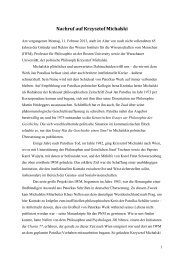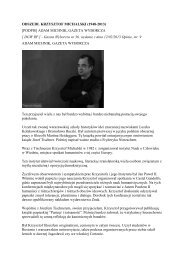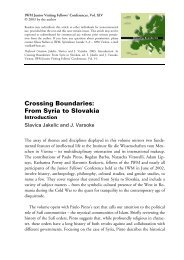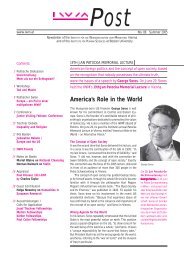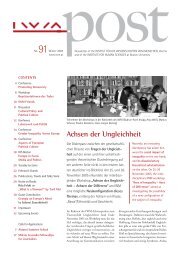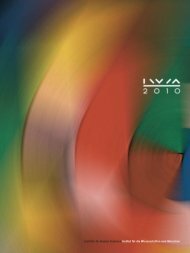Europe's Responsibility in the World of Today - IWM
Europe's Responsibility in the World of Today - IWM
Europe's Responsibility in the World of Today - IWM
Sie wollen auch ein ePaper? Erhöhen Sie die Reichweite Ihrer Titel.
YUMPU macht aus Druck-PDFs automatisch weboptimierte ePaper, die Google liebt.
GUEST CONTRIBUTION<br />
The debate over Turkey’s admission shows that Europe is actually <strong>the</strong> “torn country”, deeply divided<br />
over its cultural identity, unable to answer <strong>the</strong> question whe<strong>the</strong>r its unity should be def<strong>in</strong>ed by its<br />
Christian heritage or by its modern secular values, argues José Casanova.<br />
Could a democratic Muslim Turkey ever jo<strong>in</strong> <strong>the</strong> European<br />
Christian club or which is <strong>the</strong> torn country?<br />
30<br />
José Casanova teaches<br />
Sociology at New School<br />
University, New York. He is<br />
<strong>the</strong> author <strong>of</strong> Public<br />
Religions <strong>in</strong> <strong>the</strong> Modern<br />
<strong>World</strong> (1994) and The Opus<br />
Dei and <strong>the</strong> Modernization<br />
<strong>of</strong> Spa<strong>in</strong> (forthcom<strong>in</strong>g).<br />
THE PROSPECT OF TURKEY jo<strong>in</strong><strong>in</strong>g <strong>the</strong> European<br />
Union has generated great anxieties among Europeans,<br />
Christian and post-Christian alike, but <strong>of</strong><br />
<strong>the</strong> k<strong>in</strong>d which cannot be easily verbalized, at least<br />
not publicly. Turkey has been patiently knock<strong>in</strong>g<br />
on <strong>the</strong> door <strong>of</strong> <strong>the</strong> European club s<strong>in</strong>ce 1959, only<br />
to be told politely to keep wait<strong>in</strong>g, while watch<strong>in</strong>g<br />
latecomer after latecomer be<strong>in</strong>g <strong>in</strong>vited first <strong>in</strong> successive<br />
waves <strong>of</strong> accession.<br />
The formation <strong>of</strong> <strong>the</strong> European Coal and Steel<br />
Community (ECSC) <strong>in</strong> 1951 by <strong>the</strong> six found<strong>in</strong>g<br />
members (Benelux, France, Italy and West Germany)<br />
and its expansion <strong>in</strong>to <strong>the</strong> European Economic<br />
Community (EEC) or “common market” <strong>in</strong><br />
1957 was predicated upon two historic reconciliations:<br />
<strong>the</strong> reconciliation between France and Germany,<br />
two countries which had been at war or prepar<strong>in</strong>g<br />
for war from 1870 to 1945 and <strong>the</strong> reconciliation<br />
between Protestants and Catholics with<strong>in</strong><br />
Christian Democracy. Indeed rul<strong>in</strong>g or prom<strong>in</strong>ent<br />
Christian Democrats <strong>in</strong> all six countries played <strong>the</strong><br />
lead<strong>in</strong>g role <strong>in</strong> <strong>the</strong> <strong>in</strong>itial process <strong>of</strong> European <strong>in</strong>tegration.<br />
The Cold War, <strong>the</strong> Marshall Plan, NATO,<br />
and <strong>the</strong> newly established Wash<strong>in</strong>gton-Rome Axis<br />
formed <strong>the</strong> geopolitical context for both reconciliations.<br />
Greece <strong>in</strong> June 1959 and Turkey <strong>in</strong> July<br />
1959, hostile enemies yet members <strong>of</strong> NATO, were<br />
<strong>the</strong> first two countries to apply for association to <strong>the</strong><br />
EEC. That same July, <strong>the</strong> o<strong>the</strong>r Western European<br />
countries formed EFTA as an alternative economic<br />
association. Only Franco’s Spa<strong>in</strong> was left out <strong>of</strong> all<br />
<strong>in</strong>itial Western European associations and alliances.<br />
Granted, that <strong>the</strong> EEC always made clear that<br />
candidates for admission would have to meet str<strong>in</strong>gent<br />
economic and political conditions. Ireland,<br />
The United K<strong>in</strong>gdom and Denmark formally applied<br />
for admission <strong>in</strong> 1961 but only jo<strong>in</strong>ed <strong>in</strong><br />
1973. Spa<strong>in</strong> and Portugal were unambiguously<br />
rebuffed as long as <strong>the</strong>y had authoritarian regimes,<br />
but were given clear conditions and def<strong>in</strong>ite timetables<br />
once <strong>the</strong>ir democracies seemed on <strong>the</strong> road to<br />
consolidation. Both jo<strong>in</strong>ed <strong>in</strong> 1986. Greece, meanwhile,<br />
had already ga<strong>in</strong>ed admission <strong>in</strong> 1981 and<br />
with it de facto veto power over Turkey’s admission.<br />
But even after Greece and Turkey entered a quasidétente<br />
and Greece expressed its read<strong>in</strong>ess to sponsor<br />
Turkey’s admission <strong>in</strong> exchange for <strong>the</strong> admission<br />
<strong>of</strong> <strong>the</strong> entire island <strong>of</strong> Cyprus, Turkey still did<br />
not receive an unambiguous answer, be<strong>in</strong>g told<br />
once aga<strong>in</strong> to go back to <strong>the</strong> end <strong>of</strong> <strong>the</strong> wait<strong>in</strong>g l<strong>in</strong>e.<br />
The fall <strong>of</strong> <strong>the</strong> Berl<strong>in</strong> Wall once aga<strong>in</strong> rearranged<br />
<strong>the</strong> priorities and <strong>the</strong> direction <strong>of</strong> European <strong>in</strong>tegration<br />
eastward. In 2004 ten new members, eight<br />
ex-Communist countries plus Malta and Cyprus<br />
are set to jo<strong>in</strong> <strong>the</strong> European Union. Practically all<br />
<strong>the</strong> territories <strong>of</strong> Medieval Christendom, that is, <strong>of</strong><br />
Catholic and Protestant Europe, will be now reunited<br />
<strong>in</strong> <strong>the</strong> new Europe. Only Catholic Croatia<br />
and “neutral” Switzerland will be left out, while<br />
“Orthodox” Greece as well as Greek and Turkish<br />
Cyprus will be <strong>the</strong> only religious “o<strong>the</strong>r.” “Orthodox”<br />
Romania and Bulgaria are supposed to be next<br />
<strong>in</strong> l<strong>in</strong>e, but without clear timetable. Even less clear<br />
is if and when <strong>the</strong> negotiations for Turkey’s admission<br />
will beg<strong>in</strong> <strong>in</strong> earnest.<br />
The first open, if not yet formal, discussions <strong>of</strong><br />
Turkey’s candidacy dur<strong>in</strong>g <strong>the</strong> 2002 Copenhagen<br />
summit touched a raw nerve among all k<strong>in</strong>ds <strong>of</strong><br />
European “publics.” The widespread debate revealed<br />
how much “Islam” with all its distorted representations<br />
as “<strong>the</strong> o<strong>the</strong>r” <strong>of</strong> Western civilization<br />
was <strong>the</strong> real issue ra<strong>the</strong>r than <strong>the</strong> extent to which<br />
Turkey was ready to meet <strong>the</strong> same str<strong>in</strong>gent economic<br />
and political conditions as all o<strong>the</strong>r new<br />
members. About Turkey’s eagerness to jo<strong>in</strong> and<br />
will<strong>in</strong>gness to meet <strong>the</strong> conditions, <strong>the</strong>re could be<br />
no doubt now that <strong>the</strong> new, <strong>of</strong>ficially no longer<br />
“Islamic” government had reiterated unambiguously<br />
<strong>the</strong> position <strong>of</strong> all <strong>the</strong> previous Turkish “secularist”<br />
adm<strong>in</strong>istrations. Turkey’s “publics”, secularist<br />
and Muslim alike, had spoken <strong>in</strong> unison. The new<br />
government was certa<strong>in</strong>ly <strong>the</strong> most representative<br />
democratic government <strong>of</strong> all <strong>of</strong> Turkey’s modern<br />
history. A wide consensus had seem<strong>in</strong>gly been<br />
reached among <strong>the</strong> Turkish population, show<strong>in</strong>g<br />
that Turkey, on <strong>the</strong> issue <strong>of</strong> jo<strong>in</strong><strong>in</strong>g Europe and<br />
thus “<strong>the</strong> West” was no longer a “torn country.”<br />
Two <strong>of</strong> <strong>the</strong> three requirements stated by Samuel<br />
Hunt<strong>in</strong>gton for a torn country to redef<strong>in</strong>e successfully<br />
its civilizational identity had clearly been met:<br />
“First, <strong>the</strong> political and economic elite <strong>of</strong> <strong>the</strong> country<br />
has to be generally supportive <strong>of</strong> and enthusiastic<br />
about this move. Second, <strong>the</strong> public has to be at<br />
least will<strong>in</strong>g to acquiesce <strong>in</strong> <strong>the</strong> redef<strong>in</strong>ition <strong>of</strong> identity.”<br />
1 It was <strong>the</strong> third requirement that apparently<br />
was miss<strong>in</strong>g: “<strong>the</strong> dom<strong>in</strong>ant elements <strong>in</strong> <strong>the</strong> host<br />
civilization, <strong>in</strong> most cases <strong>the</strong> West, have to be will<strong>in</strong>g<br />
to embrace <strong>the</strong> convert.”<br />
<strong>IWM</strong> NEWSLETTER 84 Spr<strong>in</strong>g 2004/No. 2


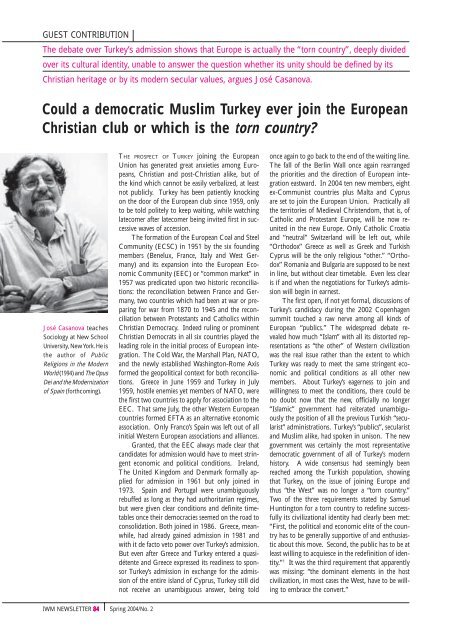
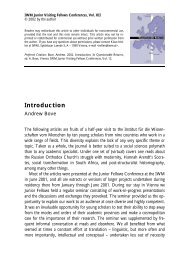
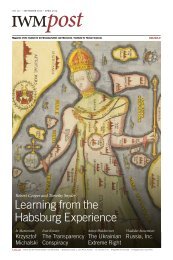
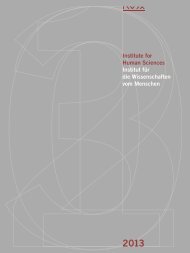
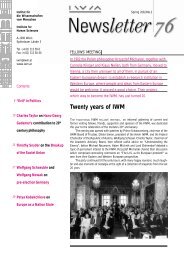
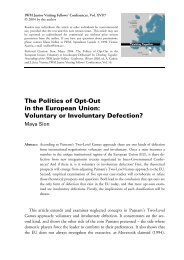
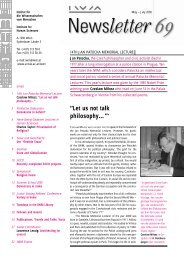
![POSZUKIWAÅ PRAWDY I ZABAWY [PODPIS] PROF ... - IWM](https://img.yumpu.com/23611273/1/184x260/poszukiwaa-prawdy-i-zabawy-podpis-prof-iwm.jpg?quality=85)
